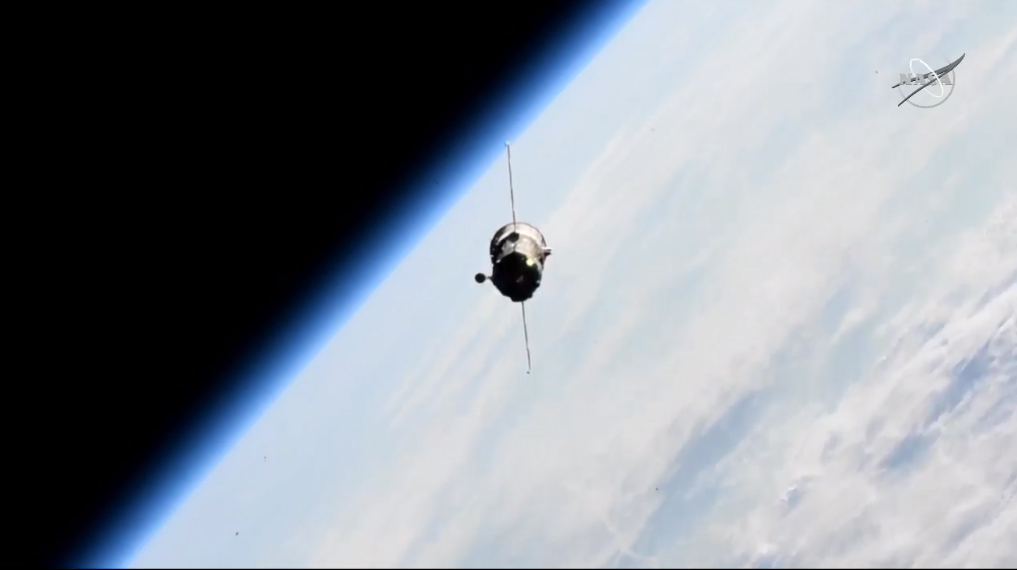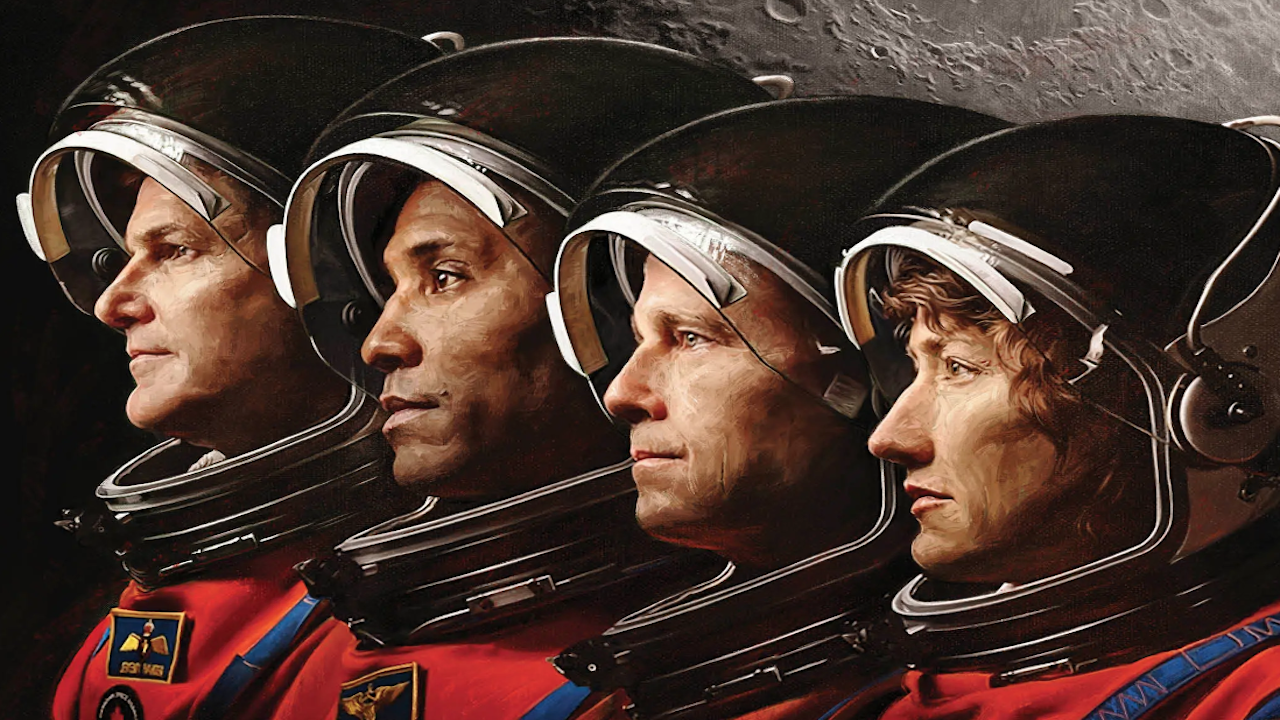Russia Has a New Plan to Dock a Soyuz at the Space Station After an Unexpected Abort
It includes a Soyuz spacecraft shuffle.

Russia's space agency Roscosmos has a new plan to dock an unpiloted Soyuz capsule at the International Space Station after the first attempt failed on Saturday (Aug. 24) and it's going to require a spaceship shuffle.
Roscosmos now aims to dock the Soyuz spacecraft, called MS-14, at the space station Monday (Aug. 26) at the aft end of the outpost's Russian-built Zvezda service module. Docking is scheduled for Monday night at 11:12 p.m. EDT (0312 Aug. 25 GMT).
But there's just one hitch: Another spacecraft is already parked at the Zvezda port.
That other spacecraft is Soyuz MS-13, which arrived at the space station July 20 with Russian cosmonaut Alexander Skvortsov, NASA astronaut Drew Morgan and European Space Agency astronaut Luca Parmitano. In order for Soyuz MS-14 to park at the Zvezda port, Soyuz MS-13 is going to have to move.
And that's exactly what the Skvortsov and his crewmates will do.
Video: Watch the Soyuz Docking Abort as It Happened
Soyuz spacecraft shuffle
On Sunday night (Aug. 25), Svortsov, Morgan and Parmitano will don their Sokol pressure suits, climb inside Soyuz MS-13 and take it on a short 25-minute flight to another station docking port. If all goes well, Svortskov will park the craft at the space-facing Poisk module on the station's Russian segment at 11:59 p.m. EDT (0359 Aug. 26 GMT).
Breaking space news, the latest updates on rocket launches, skywatching events and more!
It was that same Poisk module that the uncrewed Soyuz MS-14 tried to park itself at on Saturday, coming within 328 feet (100 meters) of the station before failing to lock on to the module during the final approach. Ultimately, station commander Alexey Ovchinin of Roscosmos commanded the spacecraft to abort the docking attempt and back away to a safe distance.
"The unpiloted Soyuz is currently orbiting a safe distance from the ISS with all of its systems functioning normally," NASA officials said in a statement Saturday. "The six crewmembers on board the station were never in any danger during the initial rendezvous attempt."
Roscosmos officials believe the Soyuz MS-14 docking failed because of a bad signal amplifier on the station that is part of an automated rendezvous system, called Kurs, which is used for navigation by visiting Russian vehicles.
Cosmonauts will replace the suspect signal amplifier over the weekend. And even if something does go wrong with the Soyuz MS-13 docking at the Poisk module, Skvortsov can always take manual control and fly it in on his own.
That wasn't possible for Soyuz MS-14 because the unpiloted vehicle does not have a human crew. There was no commander ready to take manual control during Saturday's failed docking. And while Russia's robotic Progress cargo ships can be remotely piloted by cosmonauts on the space station with a system called TORU, the Soyuz vehicle does not have such a system since they typically always have human crews aboard.
A rare Soyuz test flight
Soyuz MS-14 is the first Soyuz without a crew to ever to visit the International Space Station. Russia launched the spacecraft on a Soyuz 2.1a rocket, a variant of the Soyuz booster that is typically used to fly uncrewed Progress spacecraft. (Soyuz crew capsules have to date launched on older Soyuz FG boosters.)
This Soyuz test flight is primarily aimed at testing the compatibility of the crew capsule with the revamped Soyuz 2.1a rocket, NASA officials have said. But while this is a test flight, that doesn't mean Soyuz MS-14 will arrive at the station empty handed.
Packed aboard the Soyuz are 1,450 lbs. (658 kilograms) of food and other supplies for the six members of the station's current Expedition 60 crew. There is even a robotic passenger aboard: the humanoid Russian robot Skybot F-850.
Roscosmos equipped the robot with sensors to measure how a Soyuz launch on a 2.1a rocket might affect human crewmembers during flight. Cosmonauts on the station will also use the Skybot F-850 for a series of technology experiments in orbit before packing the robot back into the Soyuz for the return trip home.
Visit Space.com to watch the Soyuz swap and MS-14 docking on Space.com, courtesy of NASA TV, beginning Sunday night at 11 p.m. EDT (0300 GMT).
Correction: An earlier version of this story stated that Russian cosmonaut Alexander Skvortsov will dock the Soyuz MS-13 spacecraft at the space station's Poisk module Sunday at 11:34 p.m. EDT. The docking will take place at 11:59 p.m. EDT (0359 GMT).
- How Russia's Soyuz Space Capsules Work
- Roscosmos: Russia's Space Centers and Launch Sites in Pictures
- Cosmic Quiz: Do You Know the International Space Station?
Email Tariq Malik at tmalik@space.com or follow him @tariqjmalik. Follow us @Spacedotcom and Facebook.

Tariq is the award-winning Editor-in-Chief of Space.com and joined the team in 2001. He covers human spaceflight, as well as skywatching and entertainment. He became Space.com's Editor-in-Chief in 2019. Before joining Space.com, Tariq was a staff reporter for The Los Angeles Times covering education and city beats in La Habra, Fullerton and Huntington Beach. He's a recipient of the 2022 Harry Kolcum Award for excellence in space reporting and the 2025 Space Pioneer Award from the National Space Society. He is an Eagle Scout and Space Camp alum with journalism degrees from the USC and NYU. You can find Tariq at Space.com and as the co-host to the This Week In Space podcast on the TWiT network. To see his latest project, you can follow Tariq on Twitter @tariqjmalik.
